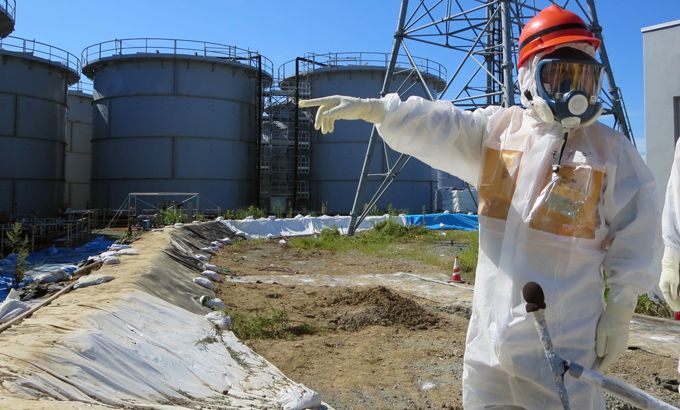Radiation surges at Japan’s Fukushima plant
Radiation near a tank of contaminated water at the crippled nuclear plant increases 18-fold to deadly levels.

Radiation near a tank holding highly contaminated water at Japan’s crippled Fukushima nuclear plant has risen 18-fold, the plant’s operator has said, highlighting the struggle to bring the crisis under control after more than two years.
Radiation of 1,800 millisieverts per hour – enough to kill an exposed person in four hours – was detected near the bottom of one storage tank on Saturday, Tokyo Electric Power Co, also known as Tepco, said on Sunday.
Keep reading
list of 4 itemsEvacuation orders issued as wildfire grows near Canada’s Alberta oil patch
Energy summit seeks to curb cooking habits that kill millions every year
Thousands evacuate as wildfire grows ‘dramatically’ in western Canada
Readings taken on August 22 measured radiation of 100 millisieverts per hour at the same tank.
Japanese law has set an annual radiation exposure safety threshold of 50 millisieverts for nuclear plant workers during normal hours.
Last month, Tepco revealed that water from the tank was leaking and Japan’s nuclear regulator later raised the severity of the leak from a level 1 “anomaly” to a level 3 “serious incident”.
The Fukushima Daiichi power plant north of Tokyo was devastated by a tsunami on March 11, 2011, that resulted in fuel-rod meltdowns at three reactors, radioactive contamination of the air, sea and food and the evacuation of 160,000 people.
It touched of the worst nuclear crisis since Chernobyl a quarter of a century earlier.
‘Deplorable’ situation
While there were no new leaks found at the tank, a Tepco spokesman said another leak had been detected from a pipe connecting two other tanks nearby.
The Tepco spokesman also said the higher level of radiation from the latest reading was partly because investigators had used a measuring instrument capable of registering greater amounts of radiation.
Tepco said last week it would invite foreign decommissioning experts to advise it on how to deal with the highly radioactive water leaking from the site.
Japan has also indicated that it might dip into a $3.6bn emergency reserve fund to help pay for the clean-up of a situation the chief cabinet secretary has described as “deplorable”.
In response to growing domestic and international criticism over Tepco’s handling of the crisis, Shinzo Abe, Japanese prime minister, promised on Thursday that his government would play a greater role in stopping leaks of highly radioactive water.
“The accident in Fukushima cannot be left entirely to Tokyo Electric Power,” he said.
“There is a need for the government to play a role with a sense of urgency, including taking measures to deal with the waste water.”